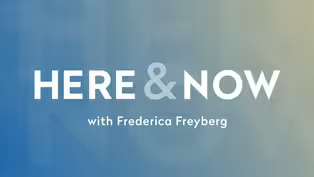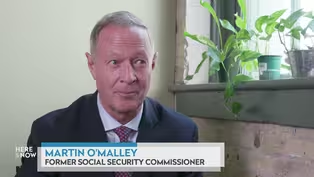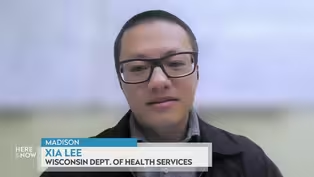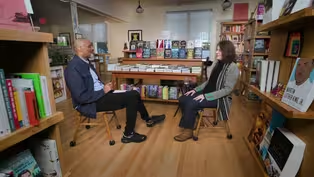Here and Now
Michael Wagner on Federal Research Grant Cuts at UW-Madison
Clip: Season 2300 Episode 2341 | 5m 51sVideo has Closed Captions
Michael Wagner on the termination of federal grants and consequences for researchers.
UW-Madison journalism professor Michael Wagner discusses the termination of a federal grant to study communication about vaccination and the consequences of funding cuts for university researchers.
Problems playing video? | Closed Captioning Feedback
Problems playing video? | Closed Captioning Feedback
Here and Now is a local public television program presented by PBS Wisconsin
Here and Now
Michael Wagner on Federal Research Grant Cuts at UW-Madison
Clip: Season 2300 Episode 2341 | 5m 51sVideo has Closed Captions
UW-Madison journalism professor Michael Wagner discusses the termination of a federal grant to study communication about vaccination and the consequences of funding cuts for university researchers.
Problems playing video? | Closed Captioning Feedback
How to Watch Here and Now
Here and Now is available to stream on pbs.org and the free PBS App, available on iPhone, Apple TV, Android TV, Android smartphones, Amazon Fire TV, Amazon Fire Tablet, Roku, Samsung Smart TV, and Vizio.
Providing Support for PBS.org
Learn Moreabout PBS online sponsorshipZach Schultz for here and.
>> Now.
>> Turning back to higher ed cuts.
He calls it the Friday night massacre of the verifiable truth a UW-Madison professor researching and amplifying accurate claims about vaccines saw his $5 federal grant terminated a week ago.
The National Science Foundation grant was axed.
Quote, per the presidential action that the NSF will not support research with the goal of combating misinformation, disinformation and malinformation that could be used to infringe on protected speech rights.
Professor of Journalism and Mass Communications Michael Wagner is here.
Ahead of this, we should note PBS Wisconsin is part of UW-Madison.
Hi, Mike.
>> Hi.
Good to see you.
>> How surprised were you?
Shocked, really, that your grant was terminated?
>> Well, in the short term, I wasn't shocked.
I mean, we've been under scrutiny from the federal government and even the weaponization of government subcommittee in the House for the last year and a half.
And so we knew this day was coming and so on the one hand, it wasn't that shocking, although we knew we didn't know exactly when it was going to happen, but more broadly, to say that researchers in the United States who made, you know, grant proposals and had them vetted by a series of experts that were blind to us, experts that were blind to u%, evaluating us, said, this is a project worth doing and that could really help people.
And then to have the government say, we're not so interested in sharing things that are true, that's really shocking.
And what's even more shocking is that it's not just happening to us.
I mean, it's a big deal to us and our team and the grant we have.
But this is happening all across campus and all across the country.
Now that is on hold.
What were you looking at and why?
>> So we were really interested in ways that we could try and improve the information environment without engaging in content moderation.
So one thing that's really controversial, and there are experts who study this is to say if some things are false or and especially if they're dangerous, maybe platforms should be pressured to take them down.
That's not what we do.
What we say is we want to identify networks of conversation online that are sharing information that might be false.
Then we want to see are there independent fact checkers and independent research studies that have been done at least three that confirm this thing that's being shared online isn't true?
If that's the case, then we want to create messages that say, here's the stuff that's true, and then we want to use the platforms advertising mechanisms to buy ads and show them to the people who saw the false stuff.
So put simply, if people are seeing things that aren't true, we want to make a message about something that is true and share it with people so that the truth can compete with the falsehood.
We don't want to take any content down, we just want those two things to compete, and then we want to see.
Does sharing the truth make things better for people?
the only sizable grant eliminated at UW-Madison.
At least $12.6 million in direct research funding has been canceled.
What are you hearing from your colleagues about all of this?
>> We organized a teach in for our undergraduate students last week, and in that conversation, one faculty member from the School of Human Ecology noted, you know, more than a dozen grants related to Social Security studies.
So this is not not just for seniors, but for lots of other folks who get Social Security benefits.
People with disabilities, children of people who have died and don't have parents anymore.
All kinds of folks who need we need to understand how well are these benefits helping them?
Is it the right amount?
Are they being, you know, distributed in the right way?
All those kinds of things, all those got immediately killed.
We've heard from people in the medical school that in some cases there are hiring freezes.
Even at the VA, so that new staff can't be hired and new research assistants can't be hired.
This is especially hard for undergraduates who say they want to go to med school, because you really need to have experience in a lab to make your application to med school, Singh.
And now it's getting harder to do those kinds of things on our campus.
So it's happening all over social sciences, hard sciences, humanities everywhere.
understand the motivation?
>> There seems to be a coordinated war on universities and their mission, because universities are places where we have really hard conversations about complex things.
There are places where the truth is iterative, and we learn more over time.
And sometimes things that we thought were true change in the face of new evidence.
Sometimes the new evidence turns out to be wrong, and the scientific process is slow and messy and controversial.
And sometimes scientists don't communicate it as clearly as they ought to.
But I think there's a coordinated war on folks who are interested in studying these kinds of things.
And I think it's worth citizens asking who is to gain by stopping misinformation research in the United States, who is to gain by stopping Social security research in the United States, whose pockets are getting lined and whose are getting fleeced?
>> So, having just spoken to Congressman Tom Tiffany, he says that people upset about these kinds of cuts, all they have to do is make a case and maybe they can be restored.
So what's your case?
>> Our case is that we have a scientifically vetted process that actually went through two phases.
The NSF for our grant had a phase one that was a much smaller word, still a lot of money, $750,000, which is a lot of money, especially in social sciences.
And it gave us a year to demonstrate a proof of concept that we can do this.
We did that.
We submitted our $5 million grant and the scientists who evaluated it said, yes, we think you can do this.
We've also been making a ton of progress that we regularly share with the NSF every year.
And so we turn in our yearly reports about, here are the new things we've learned.
Here's how we're changing what we're doing.
And so we're simply trying to learn things that are true and share them.
And I don't think it's in the interest of the United States to stop doing that.
States to stop doing that.
Here & Now opening for April 25, 2025
Video has Closed Captions
Clip: S2300 Ep2341 | 1m 2s | The introduction to the April 25, 2025 episode of Here & Now. (1m 2s)
How the 2025 NFL Draft in Green Bay Showcases Wisconsin
Video has Closed Captions
Clip: S2300 Ep2341 | 4m 12s | The 2025 NFL draft at Lambeau Field in Green Bay offers a chance to showcase the state. (4m 12s)
Martin O'Malley on Social Security Staff Reductions, Delays
Video has Closed Captions
Clip: S2300 Ep2341 | 1m 57s | Martin O'Malley on fundings cuts to Social Security staffing and frustration over delays. (1m 57s)
US Rep. Tom Tiffany on Tariffs, Funding Cuts and Immigration
Video has Closed Captions
Clip: S2300 Ep2341 | 12m 38s | Tom Tiffany on the Trump administration's actions on tariffs, spending cuts and visas. (12m 38s)
Xia Lee on the Start of Wisconsin's Warm-Weather Tick Season
Video has Closed Captions
Clip: S2300 Ep2341 | 6m 21s | Xia Lee on risks of tick-borne diseases around Wisconsin and tips to avoid these pests. (6m 21s)
In Focus with Christine Wenc: America's Finest Satire Source
Video has Closed Captions
Clip: S2300 Ep2341 | 32m 30s | Christine Wenc on her book "Funny Because It's True" about the history of "The Onion." (32m 30s)
Providing Support for PBS.org
Learn Moreabout PBS online sponsorship
- News and Public Affairs

Top journalists deliver compelling original analysis of the hour's headlines.

- News and Public Affairs

FRONTLINE is investigative journalism that questions, explains and changes our world.












Support for PBS provided by:
Here and Now is a local public television program presented by PBS Wisconsin





